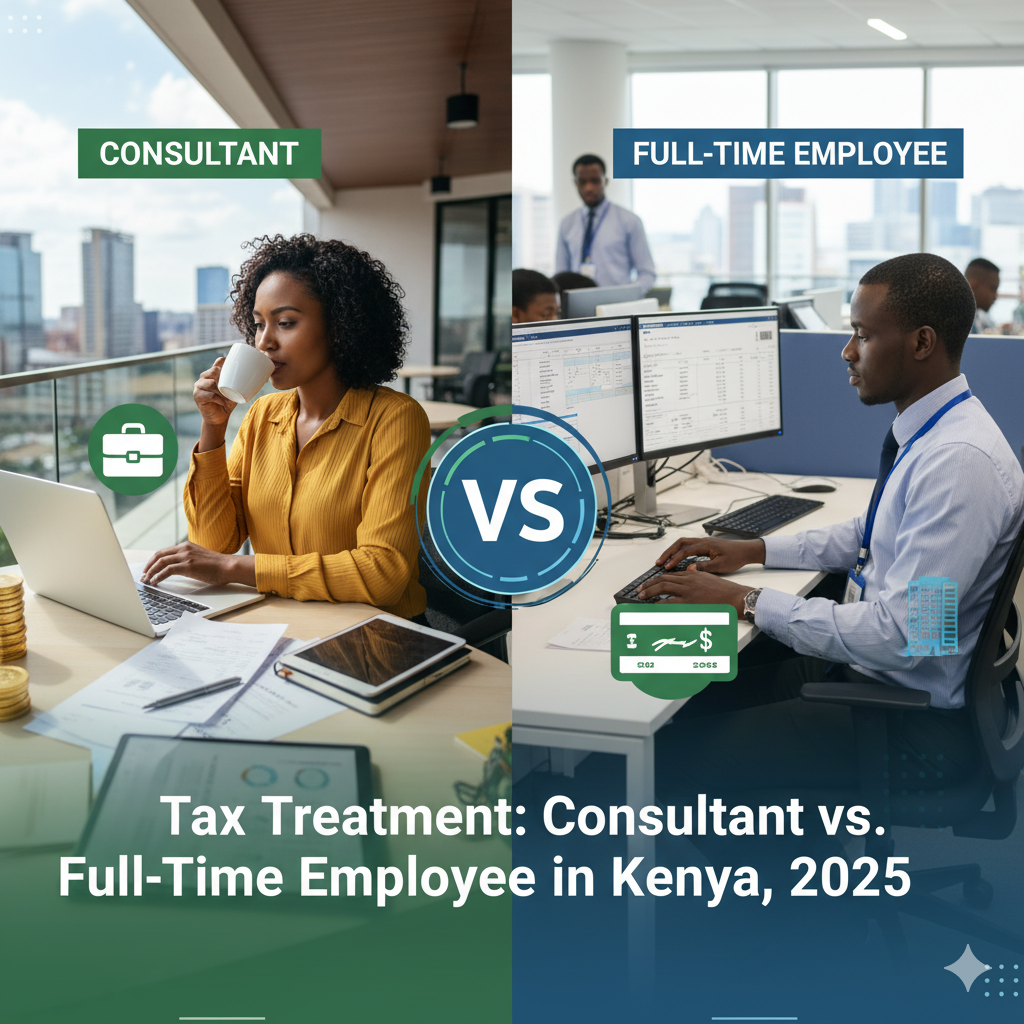Introduction: Could a Simple Contract Cost You Millions?
Imagine signing what you believe is a standard consultancy agreement—only to receive a tax demand from KRA for over KES 20 million. This is not a hypothetical scenario; it has happened.
In Kenya’s evolving tax landscape, the distinction between a consultant and a full-time employee is not academic—it can determine whether your business is compliant or exposed to costly litigation. With lean business models, outsourcing, and project-based hiring on the rise, this line is becoming increasingly blurred.
The risk is clear: are you sure your “consultant” isn’t actually an employee? If not, the Kenya Revenue Authority (KRA) may challenge you with penalties, back taxes, and interest. Recent cases show that KRA is aggressively recharacterizing consultancy agreements into employment relationships. The 2025 decision in Qhala Limited v Commissioner of Domestic Taxes illustrates the stakes.
In that case, KRA argued that 43 professionals engaged as consultants were in fact employees, making their earnings subject to PAYE rather than withholding tax. The resulting demand exceeded KES 20 million. This was not an isolated instance—it is a warning. If your business engages consultants or contractors, this case has direct implications for you.
The Digest
A. Employee or Consultant? What the Law Actually Looks At
In Qhala, the Tribunal relied on long-established indicators to distinguish employment from consultancy:
- Control: Consultants managed their own schedules, tools, and methods, showing minimal oversight.
- Integration: They operated outside the company’s internal structure.
- Mutual Obligation: No guaranteed work or standing payments.
- Economic Reality: Contractors bore their own risk and costs, even arranging their own insurance.
- Specificity of Engagement: Deliverables were project-based and time-bound, not open-ended.
- Payment Structure: Compensation was invoiced, not run through payroll cycles.
These criteria remain central under Kenyan tax law.
B. Why Did KRA Think Otherwise?
KRA flagged several features that, in its view, blurred the line:
- Regular invoicing patterns resembling payroll.
- Expense reimbursements, typical of employment.
- Clauses on confidentiality, exclusivity, and IP ownership.
- Consultants’ close integration into daily operations.
While these elements raised red flags, the Tribunal ultimately found them insufficient to override the broader indicators of independent consultancy.
Takeaway: Modern consultancy contracts often contain features that look “employment-like.” These do not automatically make a consultant an employee—but they do invite scrutiny. Businesses must be prepared to demonstrate that operational independence remains intact.
C. What This Means for Your Contracts—and Your Risk Profile
The Qhala decision should reshape how businesses think about contracts, risk, and workforce structure. Practical steps include:
- Audit contracts: Review consultancy agreements, particularly long-term or highly integrated roles.
- Align documentation with reality: If someone works like an employee, contract language alone won’t shield you.
- Avoid payroll-like patterns: Structure payments around deliverables, not calendar cycles.
- Seek proactive legal advice: Engage counsel before contracting, not after audit.
D. Applicable Taxes and Deductions
Classification directly affects tax obligations:
If classified as an employee:
- Income is subject to Pay-As-You-Earn (PAYE), deducted and remitted monthly.
- Employer obligations include SHIF, NSSF, Housing Levy, and pension contributions (where applicable).
If classified as a consultant/independent contractor:
- Payments attract withholding tax at 5% (a credit against annual self-assessment).
- If annual gross exceeds KES 5 million, the consultant must register for VAT, charge 16%, and file monthly VAT returns.
The risk: Misclassification can leave businesses liable for unpaid PAYE, penalties, interest, and potential VAT non-compliance.
Conclusion
Tax compliance is not only about filing returns—it is about properly framing working relationships from the outset. Consultancy contracts are not protective shields; KRA will look beyond labels to the substance of the engagement.
As the boundaries between employment and consultancy continue to blur, businesses carry the burden of ensuring every engagement is correctly classified, transparently documented, and lawfully taxed.
Authors:
Waithira Mugo (Tax Lawyer) & Mike Ogutu (Commercial Lawyer)
📩 Contact: info@ithera.africa
Disclaimer: This article is provided for general guidance only and does not substitute professional advice. While due diligence has been exercised, Ithera Africa accepts no liability for actions or omissions arising from reliance on this content.
